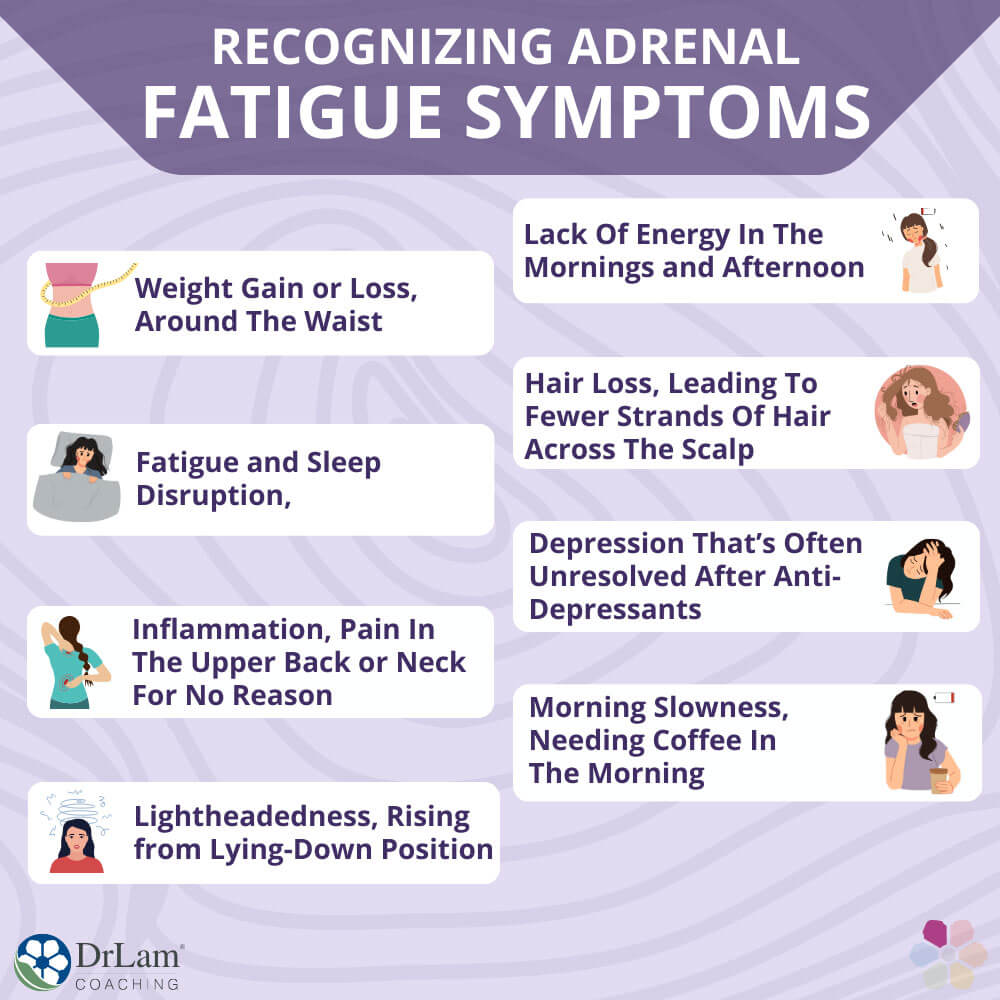 Increasing stresses - be it working long hours, family demands, or sleep deprivation - can affect your health. They can lead to adrenal fatigue, depression, and burnout. These three can sometimes be mistaken for one another, leading to misdiagnosis. Each is a different issue that can share some connection under the right circumstances, however. Burnout has the potential to lead to adrenal fatigue, and then depression. We discuss how these common issues could be connected.
Increasing stresses - be it working long hours, family demands, or sleep deprivation - can affect your health. They can lead to adrenal fatigue, depression, and burnout. These three can sometimes be mistaken for one another, leading to misdiagnosis. Each is a different issue that can share some connection under the right circumstances, however. Burnout has the potential to lead to adrenal fatigue, and then depression. We discuss how these common issues could be connected.
Adrenal Fatigue is the non-Addison's form of adrenal dysfunction, where the body's stress response cannot keep up with life's chronic stressors. This condition can result in a collection of symptoms that can seriously impact your quality of life. It is sometimes referred to as a sub-clinical syndrome, which is a condition that stays “below the surface” of clinical detection.
It starts when stress from one source or another hits your body. This activates the hypothalamic-pituitary-adrenal (HPA) axis which stimulates your adrenal glands. As a result, it produces and releases the hormone cortisol as part of the “fight or flight” response to ready the body to address threats. However, if chronic stress develops, the demand for more cortisol overwhelms your adrenals. Consequently, the adrenals become depleted and cannot supply sufficient cortisol.
Your NeuroEndoMetabolic (NEM) Stress Response is a system of related organ systems that work together to help the body manage stress. Dysregulation in the adrenals can cause other related systems to dysregulate because of the close relationship in each circuit of the NEM. This can explain some of the wide range of symptoms of adrenal fatigue.
Burnout is a condition that seems more like a psychological issue rather than a physical one. Still, symptoms associated with burnout show up physically. This condition occurs when you find yourself in a position facing high demands and constant pressure in combination with low resources or control. Additionally, people who suffer burnout often face pressures put on them with little power or authority to make changes. In addition, they may get blamed when things do not go well and seldom get credit when things go successfully.
Depression is a feeling of emptiness and despair that sinks into your life and relief seems out of reach. It can cause you to feel hopeless and sometimes angry and restless. It is an unpleasant thing to experience and also a symptom of Adrenal Fatigue. While it’s normal to have feelings of sadness or despair at different points in your life, depression goes beyond this and can even be rooted in unbalanced body chemicals.
Adrenal fatigue, burnout, and depression are different, but they can be connected. Particularly, the causes of burnout are also sources of stress that can cause adrenal fatigue, which can then lead to depression as a symptom.
 Burnout comes about as a result of long-term psychological and/or physical stress and even emotional triggers. For example, someone who works in customer service or direct customer contact often has to suppress their emotions when dealing with rude or difficult customers. Suppressing emotions and negative interactions could lead to significant stress over the long term. This stress triggers the HPA and stimulates the adrenals to release stress-fighting hormones, like cortisol. According to an article in Informed Health, the three main symptoms that are considered to be signs of burnout are exhaustion, alienation from work-related activities, and reduced performance.
Burnout comes about as a result of long-term psychological and/or physical stress and even emotional triggers. For example, someone who works in customer service or direct customer contact often has to suppress their emotions when dealing with rude or difficult customers. Suppressing emotions and negative interactions could lead to significant stress over the long term. This stress triggers the HPA and stimulates the adrenals to release stress-fighting hormones, like cortisol. According to an article in Informed Health, the three main symptoms that are considered to be signs of burnout are exhaustion, alienation from work-related activities, and reduced performance.
Prolonged stress drains the adrenals that overwork, leading to a low cortisol state and ultimately, adrenal fatigue. The adrenal glands are unable to keep pace with the demand for cortisol. Chronic stress can eventually lead to adrenal fatigue syndrome. Over time, continuing stress causes the adrenals to experience greater fatigue and then burnout.
Depression can show up as a symptom of adrenal fatigue. Adrenal depletion can cause low vitality and low energy, along with increasing social pressures and inability to meet demands. This can cause depression. Also, the link between depression and adrenal fatigue lies in the fact that both of these conditions can feed off each other. The depression from adrenal fatigue can cause further burnout and make the condition feel like it’s never-ending.
Burnout, adrenal fatigue, and depression can become a vicious cycle if left unchecked and balance isn’t restored.
Several symptoms typically accompany burnout, adrenal fatigue, and depression. There are some shared symptoms among these conditions that can be mistaken for one for the other. This is because some symptoms overlap and they often look and feel similar. Symptoms can vary from person to person, and range in severity depending on the advancement of your condition.
Characteristic symptoms of adrenal fatigue include:
In general, most people will not experience all of the highlighted symptoms. Still, these symptoms don't automatically mean that you have the condition. However, a healthcare provider familiar with adrenal fatigue can do a thorough assessment and help determine the best plan for care.

Some specific characteristics to look out for in recognizing symptoms of adrenal fatigue include:
These are only some of the specific distinctions that can help you to more easily determine if your symptoms could be related to adrenal fatigue.
 Adrenal fatigue, depression, and burnout can present increasingly severe symptoms if the condition progresses. Many people have unusual symptoms as adrenal fatigue progresses. Your body is caught in a downward spiral. Subsequently, this leads to the severe inability to perform daily functions, with symptoms such as:
Adrenal fatigue, depression, and burnout can present increasingly severe symptoms if the condition progresses. Many people have unusual symptoms as adrenal fatigue progresses. Your body is caught in a downward spiral. Subsequently, this leads to the severe inability to perform daily functions, with symptoms such as:
Adrenal burnout can leave you feeling “wired” and tired. It's almost like your body won't cooperate with you. You feel like you are robbed of your vitality. At first, you feel tired and lack the energy to work and socialize. Furthermore, you spend time resting but just can’t seem to recover. You may look good on the outside, but on the inside, you feel drained and depleted.
There are four stages of adrenal fatigue, and the third stage is further divided into four stages.
During this stage, your body is first bombarded with a variety of stressors. As a consequence, it goes into alarm mode. Your body's fight or flight response is activated, and it floods your body with different anti-stress hormones, including cortisol. If the stress continues, this alarm reaction has the potential to become chronic.
At this stage, stress becomes chronic and the adrenal glands cannot keep up with the demand for cortisol. Your fatigue starts to interfere with your daily life. You may notice that your overall performance decreases. Also, at this stage, you may experience symptoms like anxiety, PMS, irritability, frequent infections like colds, and insomnia. Furthermore, your NEM’s Hormone Circuit is begins to dysregulate and becomes unbalanced.
At this stage, your adrenals have overworked and are now at the point of exhaustion. Their cortisol output decreases significantly. However, your stress level remains high, and this starts to impact the other circuits in the NEM stress response.
More than one adrenal crash is typical at this point. Additionally, it usually takes longer to recover from each subsequent crash. The organs and systems, like the digestive system, slow down. This happens to conserve energy. As such, many experience symptoms like constipation when digestion slows down.
With adrenal exhaustion, you’re now unable to function as you would normally, even with the help of stimulants and other coping mechanisms. There are four phases of adrenal exhaustion.
In this phase, your body experiences chronic dysfunctions of single organs in the immune system, nervous system, and metabolic system. Organs are affected are affected at different times and to different degrees. Symptoms like insomnia and depression may become more pronounced. Also, you may have a greater frequency of recurring infections. Even if you can carry out a full day’s work, you’ll find that you need more sleep and rest. Your healthcare provider may be unable to find answers as to why you feel so fatigued.
 In this phase, the dysfunctions in Phase 3A spread to multiple organs. For instance, the Hormone Circuit’s hormone axes, such as the ovarian-adrenal-thyroid axis in women, can dysregulate. The hormone systems are intricately connected. If one hormone, like the thyroid hormone, has an imbalance for a long enough period, it can subsequently impact other reproductive hormones negatively too.
In this phase, the dysfunctions in Phase 3A spread to multiple organs. For instance, the Hormone Circuit’s hormone axes, such as the ovarian-adrenal-thyroid axis in women, can dysregulate. The hormone systems are intricately connected. If one hormone, like the thyroid hormone, has an imbalance for a long enough period, it can subsequently impact other reproductive hormones negatively too.
In this phase, your body cannot achieve or maintain homeostasis and is thrown off balance. Your body starts to “overreact” when trying to restore balance or make repairs. Reactions can include anxiety attacks, fluctuating blood pressure, or fluctuating blood sugar levels. Also, in this phase, your body is not at its normal level of strength.
Furthermore, there is a reduction in its capacity to use various compensatory mechanisms that often lead to uncontrolled reactions. The result is that many remedies can do more harm than good. As such, you should avoid experimental remedies on your own in addressing your adrenal fatigue. You don’t want to create more stressors and add more pressure to your already struggling body.
In this phase, adrenal failure is not far away, and the Hormone Circuit of the NEM response is near complete depletion. Adrenal functioning fails because of a lack of sufficient hormones to keep them going. Specifically, your body will shut down the systems not necessary for survival, and a catabolic state will develop. Moreover, your muscles will begin to break down in an attempt to create energy. However, the fuel you gain will only last for a short part of the day, and adrenal crashes will occur more frequently. You may find that may have to spend more time in bed.
At this stage, adrenal failure occurs, as the adrenals go through complete exhaustion. The risk for cardiovascular collapse and death is high at this point. When Adrenal Fatigue reaches this stage, the line between it and Addison’s disease, aka adrenal insufficiency, can become blurred. Both represent a continuum of decompensation in adrenal function. When Adrenal Fatigue reaches this stage, a severe advanced adrenal crisis emerges and mimics an Addisonian crisis or acute adrenal insufficiency. Some symptoms include sudden, penetrating pain in the lower back, abdomen, or legs, severe vomiting and diarrhea, dehydration, low blood pressure, and loss of consciousness.
Adrenal shock is a condition in which your adrenal glands fail to make enough cortisol. It’s a life-threatening complication because it can cause a lack of blood flow. Shock progresses quickly and has the potential to damage your organs, like your adrenal glands, and affect the tissues in your body. Symptoms increase in severity can include intense pain in the legs, abdomen, and lower back, severe vomiting, dehydration, constipation, drop in blood pressure, and fainting and weakness.
There are certain strategies for adrenal fatigue recovery. Burnout, adrenal fatigue, and depression can be reversed with the right help and guidance. The recovery time is different for everyone, but most take 6 months to 2 years to start feeling well again.
Some steps that you will need to take for adrenal fatigue recovery include:
 Stress management: Reduce stressors such as marital, family, relationship, or financial issues. You should rest when needed, share your feelings with a friend or counselor, eliminate negative self-talk, meditate, and do other activities that can reduce your stress.
Stress management: Reduce stressors such as marital, family, relationship, or financial issues. You should rest when needed, share your feelings with a friend or counselor, eliminate negative self-talk, meditate, and do other activities that can reduce your stress.Adrenal fatigue, depression, and burnout are all connected and can be part of a vicious cycle. Stress can lead to burnout, which can cause adrenal fatigue, and depression can manifest as a symptom of the condition.
If you would like to learn about natural ways to support your adrenal fatigue recovery, the team at Dr. Lam Coaching can help. We offer a free** no-obligation phone consultation at +1 (626) 571-1234 where we will privately discuss your health concerns and various options. You can also send us a question through our Ask The Doctor system by clicking here.
Alghadir, Ahmad, and Gabr, Sami. "Physical Activity and Environmental Influences on Adrenal Fatigue of Saudi Adults: Biochemical Analysis and Questionnaire Survey." Journal of Physical Therapy Science, vol. 27, no. 7, 2015, pp. 2045-2051, https://pubmed.ncbi.nlm.nih.gov/26311923/
InformedHealth.org [Internet]. Cologne, Germany: Institute for Quality and Efficiency in Health Care (IQWiG); 2006-. Depression: What is burnout? [Updated 2020 Jun 18]. https://www.ncbi.nlm.nih.gov/books/NBK279286/
Adrenal fatigue, depression, and burnout can connect to create a vicious cycle that overwhelms your body and compromises your health. Burnout is caused by stress and chronic stress can lead to adrenal fatigue, which can manifest depression as a symptom.
